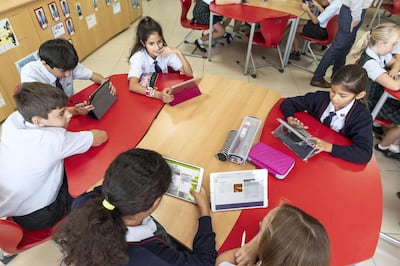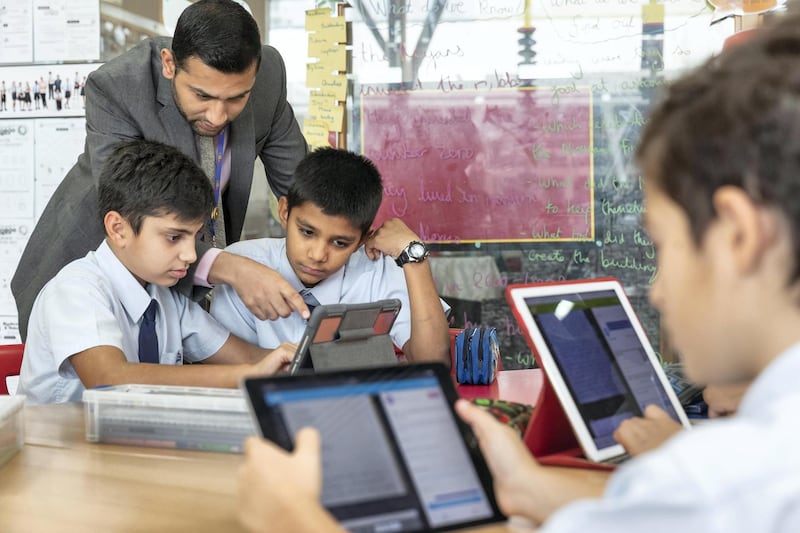A social platform that allows teachers to share pupils' creative writing with the world is motivating children to pen more stories, while improving the standards of writing in Dubai.
Pupils in Dubai are using the platform, called Pobble, to connect with their counterparts in China, Europe, UK and the UAE, to read each other's work and share feedback.
Educators in Dubai say pupils, especially young boys who were reluctant to write earlier, now want to be read by their peers, parents and family in different parts of the world.
Pobble, which was started in 2013 by a group of teachers based in North Yorkshire in England, allows teachers to plan lessons. Pupils can also research writing by their counterparts in different parts of the world, leave comments and receive feedback on their own pieces.
Andi Price, English lead at Ranches Primary School in Dubai, said the level of writing among his pupils has "shot through the roof" since the school started using Pobble last year.

“When looking at biographies or autobiographies, the first thing we do is search the 100,000 pieces of work on Pobble," said Mr Price, explaining how the platform works.
"The children filter and find the good examples, and immediately strike up a connection with the pupils who have written those pieces. The children also publish on Pobble and see the comments roll in,” he said. Parents are notified when their child’s work is published.
The platform has been a huge help in getting children to write, said Mr Price.
"I have been a teacher for 20 years and the motivation factor is number one. The boys in my class now see the point in writing because they have got an audience. Earlier they were reluctant to write in their books, but now they want to publish more and more,” he added.
The class will publish their first post in Arabic in a week, said Mr Price.
"When I told the children they will be publishing their work in Arabic their eyes lit up,” he said.
Expat children sometimes don’t see the worth of learning Arabic – but platforms like Pobble give them a purpose, he added.
And the platform was recently the source of public acclaim after a pupil's piece about Anthony Horowitz's book Stormbreaker was celebrated by the popular author on Twitter.
Russell Smart, assistant head teacher at Kings’ School Al Barsha in Dubai, said the school had been using Pobble for more than two years.
The platform has helped the school compare the writing level of their pupils to their British counterparts, he said.
“We do so much writing in books and it's read by the class or by the teacher. However, publishing it on Pobble means it's read by anyone, especially for our expat children,” he said.
The school’s home page has received 7,000 views, while 935 comments have been posted on their work.
________
Read more:
Books down: UAE education evolves outside classroom
Arabic is not a priority for young people in Dubai, say educators
Children often not getting full use out of classroom tech, experts say
_______
“We have published over 300 authors. I have been teaching for 15 years and historically it’s always the boys in upper primary children who have difficulty with when it comes to writing. This has given their writing a real purpose whether they are sharing it with their classmates or with the wider community,” said Mr Smart.
Pupils are encouraged to appreciate the pieces and leave positive remarks, as well as critique them.
The school posted writing in Arabic last week, Mr Smart said.
“We wanted to motivate those writers and to raise the profile of Arabic writing in the school,” he said.
Razan Shuqair, a Jordanian-British mother living in Dubai said her daughter, Sara Al Louzi, 10 – a year five student at Kings' School Al Barsha – was very excited that her work has been published on Pobble.
“She loves the fact that her writing has been acknowledged and celebrated by the school. It’s very encouraging and motivating. Now that her first piece was published, she wants to write more,” said Ms Shuqair.
“She never had the confidence earlier, but this has given it a boost. She believes in her writing a little bit more. Family members living abroad can also read her stories,” she said.
Sara likes writing descriptive stories in both Arabic and English, added Ms Shuqair.
“This is a great way to get students to write in Arabic. Writing is something personal and getting acknowledgement makes a difference,” she said.
Simon Blower, a former primary school deputy head teacher, is now the operations director and co-founder of Pobble.
“Pobble is an educational platform, designed by and for teachers to help improve children’s writing. Pobble is open for teachers to use in ways that best support the needs of their pupils. During our last visit, Kings’ School Al Barsha suggested the potential of sharing Arabic work as well, which we are delighted they have now taken up,” said Mr Blower.







